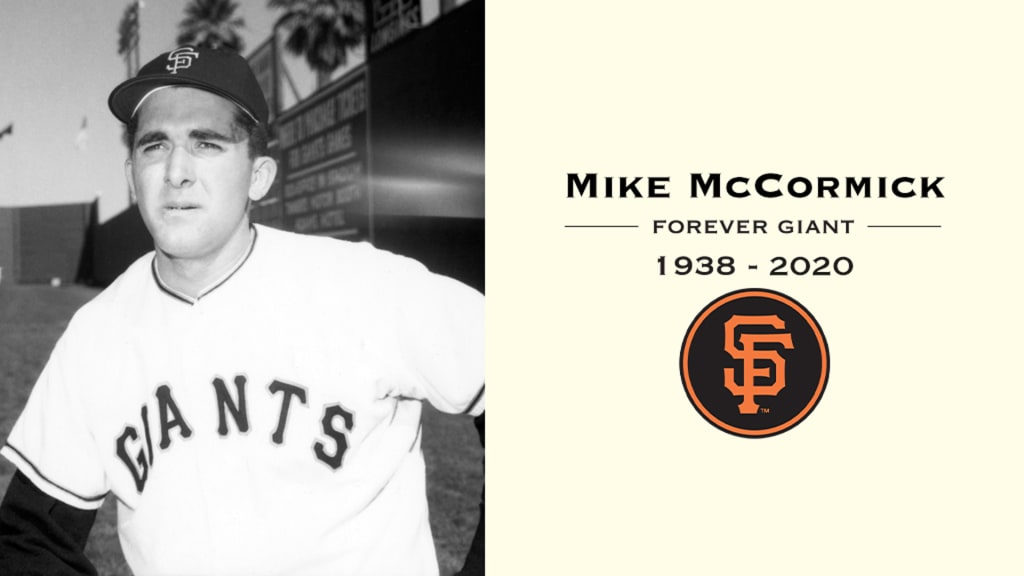
Mike McCormick, who established a standard for excellence as the Giants’ first Cy Young Award winner, died Saturday at his home in Cornelius, N.C., after a long battle with Parkinson’s Disease. He was 81.
McCormick, a member of the inaugural Giants team that played in San Francisco after the club moved from New York in 1958, had lived with Parkinson’s disease for several years. One of the last public appearances he made with the team was in August 2016, when he attended Gaylord Perry’s statue dedication at Oracle Park.
“We are deeply saddened by the loss of Mike McCormick, a true gentleman and forever Giant,” Giants president and CEO Larry Baer said. “Like many Giants fans, I have many fond childhood memories of watching Mike pitch at Candlestick Park and then was blessed to call him my friend these past 30 years. As a member of the inaugural San Francisco Giants team in 1958, Mike helped establish baseball on the West Coast and then went on to play a major role in the legendary Giants teams of the 1960s, becoming San Francisco’s first pitcher to win a Cy Young Award. Following his illustrious playing career, Mike settled in the Bay Area and was a regular presence at Giants games and countless Giants functions, from Giants Community Fund fundraisers, to team reunions, to fantasy camps. He was the ultimate Giants ambassador and lived life to the fullest. He will be greatly missed by our Giants family and our thoughts are with Dierdre and the entire McCormick family.”
Perry and Juan Marichal, separately or together, anchored the Giants’ starting rotation during most of the 1960s. But while Marichal exceeded 20 victories six times in a seven-year stretch and Perry established himself as a co-ace by winning 21 games in 1966, it was McCormick who earned the National League's premier pitching honor in 1967.
Forty-one years would pass before another Giant would top the NL Cy Young voting conducted by the Baseball Writers’ Association of America: Tim Lincecum in 2008.
McCormick finished 22-10 with a 2.85 ERA in 40 outings during his Cy Young-winning year. In 35 starts, he logged 14 complete games and five shutouts. It was his most successful season since 1960, when McCormick’s 2.70 ERA led the NL.
Michael Francis McCormick was born on Sept. 29, 1938, in Pasadena, Calif. He grew up during a period when southern California overflowed with baseball talent. Hall of Fame right-hander Don Drysdale of the Dodgers, All-Star left-hander Bill Lee of the Red Sox and second baseman Ken Hubbs, the NL's 1962 Rookie of the Year with the Cubs, were among McCormick’s contemporaries.
Possessing a well-above-average fastball, McCormick commanded a $50,000 bonus from the Giants when they signed him in 1956. McCormick enjoyed recalling a day shortly after he reported to the ballclub when he was shagging flies before a Giants-Dodgers game. Somebody behind him playfully said, “Gee, I’ve always wanted to see what a $50,000 arm feels like.” It was Dodgers first baseman Gil Hodges, one of the most respected figures in baseball.
As a “bonus baby,” McCormick had to remain on the Major League active roster for at least two years. But a demotion wasn’t necessary. In 1958, he began making an impact, finishing 11-8 in 42 appearances (28 starts). He won at least 12 games in each of the next three seasons and was the youngest pitcher in Major League history to win 50 games until Dwight Gooden beat his record in 1986.
Ominously, McCormick began feeling discomfort in his throwing shoulder toward the end of the 1961 season. He probably had bone spurs or rotator cuff damage, but this was the era when athletes not only played while injured for fear of losing their jobs, medical options were fewer.
“Management was different then,” McCormick said in a March 2002 interview with the San Francisco Chronicle. “They didn’t want any workmen’s compensation claims. Today, teams would try to protect a valuable young asset, but not then. If you were hurt, it was just, move over, here comes the next guy.”
In 1962, when the Giants won their first NL pennant since moving to San Francisco, McCormick endured mixed results while trying to pitch through his ailment. He posted a 5-5 record with a 5.38 ERA in 28 appearances (15 starts) and made one appearance in a three-game playoff against the Dodgers for the pennant but did not pitch in the World Series. On Dec. 15, 1962, the Giants traded McCormick, right-hander Stu Miller and catcher John Orsino to Baltimore for catcher Jim Coker, right-hander Jack Fisher and left-hander Billy Hoeft.
Left-handers have a way of reinventing themselves, however. This was the case with McCormick, who gradually regained durability and pitched 216 innings for Washington in 1966, the first time he had exceeded 200 innings since '61. The Giants, who struggled to develop top-flight pitchers within their own Minor League system (Marichal and Perry being the exceptions) reacquired McCormick from Washington for outfielder Cap Peterson and right-hander Bob Priddy on Dec. 13, 1966.
“I was 100-percent physically only in my last five seasons,” McCormick said in the Chronicle interview. “But I had some of my better seasons after I was hurt. My salvation was that I was left-handed and had good control, so I was allowed to stay around.”
McCormick still needed a cortisone shot during Spring Training to give himself a jump-start in the 1967 season. “I would never have gotten out of spring camp without the cortisone,” he said. “I wasn't pain-free during the season, but I could pitch.”
Two months into the season, McCormick owned a 3-2 record and 4.64 ERA; he was appearing mostly as a spot starter. He pitched an eight-hit shutout in a 5-0 decision over the Mets on June 4, but didn’t join the Giants’ starting rotation full-time until after he defeated Cincinnati, 6-3, with a complete-game effort on June 19.
That began a 25-start stretch in which McCormick compiled a 17-7 record with a 2.62 ERA and 13 complete games. He worked at least seven innings in 21 of those starts. Opponents batted .225 against him as he yielded 163 hits, walked 65 and struck out 111 in 195 2/3 innings. Overall, McCormick pitched a career-high 262 1/3 innings.
“He had that screwball going well,” recalled right-hander Bob Bolin, who pitched for the Giants from 1961-69. “He could turn it over and throw it in the dirt, right on the outside corner, as well as anybody.”
In the Cy Young balloting that year, McCormick captured 18 of 20 first-place votes while Philadelphia’s Jim Bunning and Chicago’s Ferguson Jenkins received one apiece.
Over his career, McCormick was selected to four All-Star teams, making the NL squad twice in 1960 and '61 (that was when the leagues still played two All-Star Games per year). Only five Giants starters have matched or topped McCormick’s All-Star total: Marichal (10), Carl Hubbell (9), Johnny Antonelli (6), Madison Bumgarner (4) and Lincecum (4).
Excepting McCormick’s three victories in 1957 with New York, he won 104 games for the Giants. That ranked as the highest total by any left-hander during the team’s West Coast tenure -- and third overall behind Marichal (238) and Perry (134) -- until Kirk Rueter won his 105th game in 2005 to surpass McCormick on both lists.
McCormick posted a 107-96 record overall in 11 seasons with the Giants (1956-62 and 1967-70). He also pitched for the Senators, Orioles, Yankees and Royals before back surgery forced him to retire in 1972. His career record included a 134-128 mark with a 3.73 ERA.
He is recognized for hitting the 500th home run by a big league pitcher, and he gave up Hank Aaron's 500th home run. Because of that, he personalized his license plate with the words "Mr. 500."
McCormick could still be seen performing in a Giants uniform into the mid-'70s, when he frequently pitched to fans between games of doubleheaders at Candlestick Park as part of a promotional venture. He spent most of his retirement working for various office equipment companies in the Bay Area.
He is survived by four children and his second wife, Dierdre.



